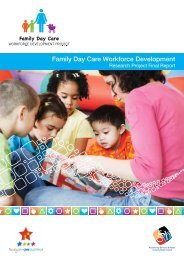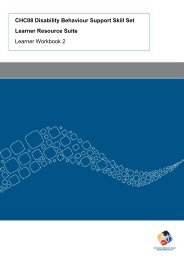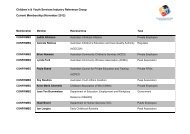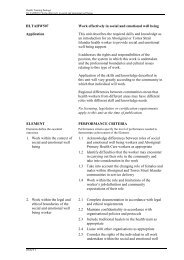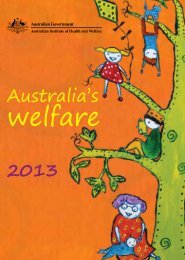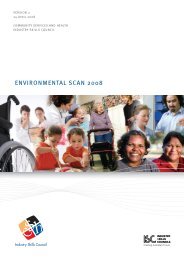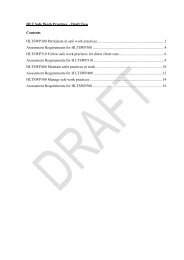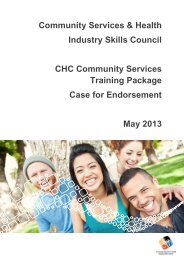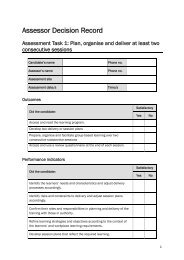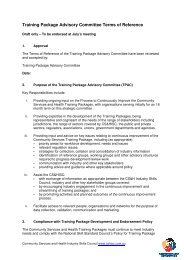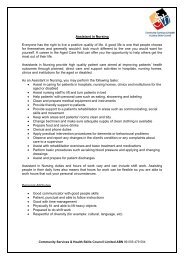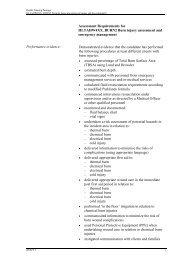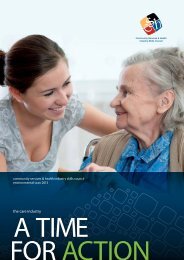Facilitator Guide - Community Services & Health Industry Skills ...
Facilitator Guide - Community Services & Health Industry Skills ...
Facilitator Guide - Community Services & Health Industry Skills ...
You also want an ePaper? Increase the reach of your titles
YUMPU automatically turns print PDFs into web optimized ePapers that Google loves.
CHC08 Disability Behaviour Support Skill Set<br />
· Prioritise and manage the changing service needs of clients with complex and special care needs Part Four: 1.5<br />
· Liaise and report to appropriately persons/agencies Part Four: 2.5, 2.8, 2.9<br />
· Adhere to own work role and responsibilities Part Four: 2.5, 2.8, 2.9<br />
· Recognise own limitations and the need for assistance Part Four: 2.18, 2.19<br />
· Work collaboratively with colleagues, health professionals and other services Part Four: 2.17, 2.18, 2.19<br />
· Apply problem solving skills that require negotiation and mediation skills to resolve problems of a difficult Part Four: 2.18, 2.19<br />
nature within organisation protocols<br />
· Collaborate and network with a variety of stakeholders in order to achieve service objectives Part Four: 2.15, 2.16<br />
· Safely use and coordinate the use of relevant technology effectively in line with occupational health and safety Part One: 1.23, 1.24, 1.25<br />
(OHS) guidelines<br />
· Follow organisation policies and protocols Part One: 2.1<br />
· Apply basic knowledge of physiology and psychology of different types of disability and principles of assessment<br />
in determining, monitoring and evaluating the service needs of the older person with complex or special needs as it<br />
relates to the work role<br />
· Apply reading and writing skills required to fulfil work role in a safe manner and as specified by the<br />
organisation/service:<br />
- this requires a level of skill that enables the worker to follow and give work-related instructions and directions and<br />
the ability to seek clarification and comments from clients, colleagues, health professionals and other service<br />
providers<br />
- industry work roles will require workers to possess a literacy level that will enable them to, read and write client’s<br />
service delivery plans, record in health records, complete assessment tools and write reports and submissions<br />
· Apply oral communication skills required to fulfil work role in a safe manner and as specified by the<br />
organisation:<br />
- this requires a level of skill that enables the worker to follow work-related instructions and directions and the<br />
ability to seek clarification and comments from supervisors, clients and colleagues<br />
- industry work roles will require workers to possess effective verbal and non-verbal communication skills that will<br />
enable them to ask questions, clarify understanding and meaning, recognise and interpret non-verbal cues, adapt<br />
communication styles to meet specific needs, provide information and express encouragement and support<br />
· Apply numeracy skills required to fulfil work role in a safe manner and as specified by the organisation:<br />
- industry work roles will require workers to be able to perform mathematical functions, such as addition and<br />
subtraction up to three digit numbers and multiplication and division of single and double-digit numbers<br />
Part Four: 1.1<br />
Part Four: 1.2, 1.6<br />
See also Part One: 2.8, 2.9, 2.10<br />
Part Four: 1.9, 2.4<br />
Part Four: 3.2, 3.5<br />
Part One: 2.8, 2.9, 2.10<br />
3.2, 3.5<br />
Part One: 2.8, 2.9, 2.10<br />
Part Four: 1.9<br />
See also Part Three: 2.2<br />
<strong>Facilitator</strong> <strong>Guide</strong><br />
© <strong>Community</strong> <strong>Services</strong> and <strong>Health</strong> Industries <strong>Skills</strong> Council Ltd www.cshisc.com.au Page 32 of 42




